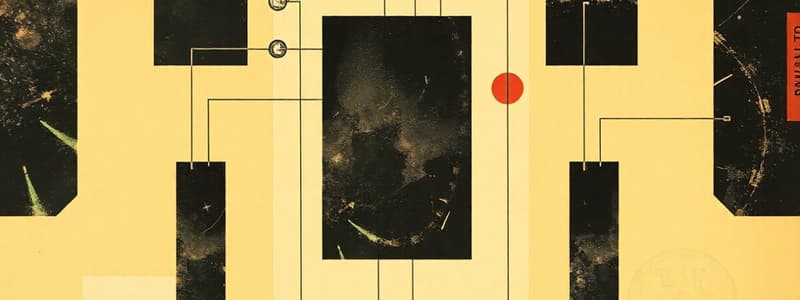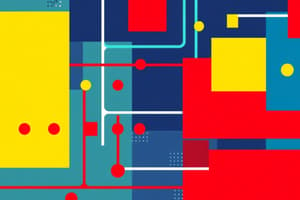Podcast
Questions and Answers
What is the primary function of a flip-flop in digital circuits?
What is the primary function of a flip-flop in digital circuits?
- Store binary information (correct)
- Transmit signals
- Perform arithmetic operations
- Control timing operations
A ripple adder can be described as a type of sequential logic circuit.
A ripple adder can be described as a type of sequential logic circuit.
False (B)
What does the output of a sequential logic circuit depend on?
What does the output of a sequential logic circuit depend on?
Input and previous state of the circuit
A register copy operation uses both ______ and combinatorial logic.
A register copy operation uses both ______ and combinatorial logic.
Match the following types of circuits with their characteristics:
Match the following types of circuits with their characteristics:
What is the state table used for in sequential logic circuits?
What is the state table used for in sequential logic circuits?
Sequential logic circuits can only be used for memory-related applications.
Sequential logic circuits can only be used for memory-related applications.
Explain what a ripple adder does.
Explain what a ripple adder does.
In a logic circuit, which Boolean operation corresponds to a circuit where the alarm is triggered when at least one of the doors is open?
In a logic circuit, which Boolean operation corresponds to a circuit where the alarm is triggered when at least one of the doors is open?
The output Q will be 0 when all door inputs are 0.
The output Q will be 0 when all door inputs are 0.
What is the Boolean equation that represents the truth table provided?
What is the Boolean equation that represents the truth table provided?
The output Q will be 1 when the inputs are _____ and _____ regardless of other inputs.
The output Q will be 1 when the inputs are _____ and _____ regardless of other inputs.
Match the types of logic gates to their primary functions:
Match the types of logic gates to their primary functions:
Which logic gate would be necessary to use when you want to raise an alarm only when all three doors are open?
Which logic gate would be necessary to use when you want to raise an alarm only when all three doors are open?
Sequencing logic mechanisms are not useful in digital circuits.
Sequencing logic mechanisms are not useful in digital circuits.
What is the primary application of combinatorial logic in digital circuits?
What is the primary application of combinatorial logic in digital circuits?
Which of the following operators is TRUE only if both input operands are true?
Which of the following operators is TRUE only if both input operands are true?
The output of a NAND gate is true only if both inputs are true.
The output of a NAND gate is true only if both inputs are true.
What is the main purpose of a multiplexer in electronics?
What is the main purpose of a multiplexer in electronics?
In Boolean algebra, the result of the operation A ⊕ B is __ if A and B are both true.
In Boolean algebra, the result of the operation A ⊕ B is __ if A and B are both true.
Match the following logic gates with their outputs:
Match the following logic gates with their outputs:
Which statement is true about combinatorial logic?
Which statement is true about combinatorial logic?
Sequential logic operations do not consider past inputs in their outputs.
Sequential logic operations do not consider past inputs in their outputs.
What type of gate combines an AND operation followed by a NOT operation?
What type of gate combines an AND operation followed by a NOT operation?
The three fundamental operations in Boolean logic are AND, OR, and __.
The three fundamental operations in Boolean logic are AND, OR, and __.
What is the result of an inclusive OR operation when applied to inputs A = 0 and B = 0?
What is the result of an inclusive OR operation when applied to inputs A = 0 and B = 0?
DeMorgan’s Theorems state that A + B is equivalent to A AND B.
DeMorgan’s Theorems state that A + B is equivalent to A AND B.
What type of adder handles possible carry from a previous bit?
What type of adder handles possible carry from a previous bit?
The __ table lists the outputs for all possible input combinations in Boolean operations.
The __ table lists the outputs for all possible input combinations in Boolean operations.
Match the following types of digital circuits with their characteristics:
Match the following types of digital circuits with their characteristics:
Flashcards
Sequential Logic Circuits
Sequential Logic Circuits
Circuits where the output depends on both the current input and the previous state of the circuit.
Flip-Flop
Flip-Flop
The basic memory element, used in sequential logic.
State Table
State Table
A table showing the outputs of a sequential circuit for all possible input and previous state combinations.
Finite State Machines
Finite State Machines
Signup and view all the flashcards
2-bit Adder
2-bit Adder
Signup and view all the flashcards
Ripple Adder
Ripple Adder
Signup and view all the flashcards
Register Copy Operation
Register Copy Operation
Signup and view all the flashcards
Load Instruction Steps
Load Instruction Steps
Signup and view all the flashcards
Truth Table for Logic Circuit
Truth Table for Logic Circuit
Signup and view all the flashcards
Boolean Equation
Boolean Equation
Signup and view all the flashcards
Logic Circuit with 3 Doors
Logic Circuit with 3 Doors
Signup and view all the flashcards
Logic Circuit with 2 Doors (any)
Logic Circuit with 2 Doors (any)
Signup and view all the flashcards
Logic Circuit with 3 Doors (2 open)
Logic Circuit with 3 Doors (2 open)
Signup and view all the flashcards
Digital Signal
Digital Signal
Signup and view all the flashcards
Logic Gates
Logic Gates
Signup and view all the flashcards
Boolean Algebra
Boolean Algebra
Signup and view all the flashcards
AND operation
AND operation
Signup and view all the flashcards
OR operation
OR operation
Signup and view all the flashcards
NOT operation
NOT operation
Signup and view all the flashcards
Truth Table
Truth Table
Signup and view all the flashcards
Combinatorial Logic
Combinatorial Logic
Signup and view all the flashcards
Sequential Logic
Sequential Logic
Signup and view all the flashcards
Digital Circuits
Digital Circuits
Signup and view all the flashcards
NAND gate
NAND gate
Signup and view all the flashcards
NOR gate
NOR gate
Signup and view all the flashcards
Multiplexer
Multiplexer
Signup and view all the flashcards
Half-Adder
Half-Adder
Signup and view all the flashcards
Full-Adder
Full-Adder
Signup and view all the flashcards
Inclusive-OR
Inclusive-OR
Signup and view all the flashcards
Exclusive-OR
Exclusive-OR
Signup and view all the flashcards
Study Notes
System Software and Computing Concepts: Logic Gates
- Logic gates are the fundamental building blocks of digital circuits.
- Computers are made of integrated circuits (ICs)
- ICs use transistors, resistors, and capacitors.
- Transistors control the flow of electrons (electricity). These components can either start or stop the current
- Transistors are the key component of integrated circuits, enabling the creation of extremely dense circuits
- Integrated circuits are sophisticated combinations of transistors, resistors, and capacitors, designed for specific functions like CPUs, bus interfaces, and memory management units.
- A motherboard is a printed circuit board, that houses the central processing unit (CPU), memory and other essential components.
- Logic design uses Boolean algebra
- Boolean algebra uses logical operators (AND, OR, NOT) to represent and manipulate digital signals
Topics Covered
- Types of Logic Gates
- Boolean Algebra
- Truth Tables
- Logic Gate Design
Learning Outcomes
- Define logic gates
- Discuss the characteristics of logic gates
- Explain the functions of AND, OR, NAND, NOR, and Exclusive OR gates.
- Design circuits using logic gates
- Define Boolean Equations
- Draw Truth Tables
Key Terms
- Integrated Circuit
- Switching Circuit
- Logic Gate
- Transistor
- Resistor
- Capacitor
- Karnaugh Map
- Truth Table
- Boolean
Introduction
- Computers are collections of digital switches represented by ICs.
- Integrated circuits are designed for special functions (e.g., CPU, bus interface, memory).
- ICs are composed of transistors, resistors, capacitors, and other electronic components.
- The density of transistors in modern ICs is incredibly high, often millions of transistors fitting onto small areas.
Transistors
- Transistors control electron movement and electricity flow, similar to a water faucet
- They control both whether a current flows and the amount
- They are the primary components of ICs, enabling intricate digital operations
Resistors & Capacitors
- Resistors and capacitors are electronic components crucial for circuit operation
- Resistors limit current flow and capacitors store electrical charge.
Motherboard
- A complex printed circuit board that houses fundamental components.
Logic
- Reasoning according to strict validity principles.
- A set of principles that define how elements are arranged in a computer to perform a task
- A system to codify logic proof and inference
Algebra (Boolean)
- Boolean algebra forms the base of logic design in computers.
- Transistors implement Boolean algebra.
- Switches represent 0s and 1s of binary logic in circuits.
- These elements combine into logic gates.
Digital Circuits
- Combinatorial logic: results depend only on present inputs to an operation—arithmetic, data movement, comparison.
- Sequential logic: considers input, the current operation, and previous results—used in counters.
Boolean Algebra
- Rules for constants and variables with 2 states (true/false, on/off, yes/no, 0/1).
- Uses AND, OR, NOT operators
- Truth tables detail every possible input combination's outputs
Boolean Operators
- AND: Outputs TRUE only if all inputs are TRUE.
- Inclusive OR: Outputs TRUE if at least one input is TRUE
- NOT: Inverts the input value
- Exclusive OR: Outputs TRUE if one and only one input is TRUE
Boolean Algebra Operations
- Principles like "Associative", "Distributive", and "Commutative" govern these operations.
- DeMorgan's Theorems relate complements of Boolean expressions.
Gates and Combinatorial Logic
- Many computer functions are Boolean equation-defined.
- Examples like sum of two binary numbers use truth tables to display computation outcomes
Computer Implementation
- Gates (logic gates) are constructed from transistor switches within integrated circuits (ICs).
- VLSI (Very Large Scale Integration) enables complex circuit designs with millions of transistors.
Boolean Algebra Implementation
- Common ways to combine logic gates include NAND and NOR.
- Using NAND or NOR gates alone to express other gate functions
Multiplexer
- A device selects one of several input signals to transmit over a single line
- This improves bandwidth by sending many signals over a single line
Half & Full Adders
- Basic building blocks for digital arithmetic operations
- Half adders handle two bits
- Full adders incorporate an existing carry bit, accommodating more complex calculations
Sequential Logic Circuits
- Outputs depend on both current input values and previous states
- Flip-flops help as basic memory elements
- State tables show all input/previous state combinations and the subsequent outputs
Flip-Flop Types
- Various types of flip-flops (SR, T, JK, D) have distinct capabilities and uses
Register Copy Operation
- A process that copies data between registers, employing both sequential and combinatorial logic
Steps in a LOAD Instruction
- Specific steps involved in loading data into a register, controlling memory access, and executing instruction sets
Example
- Illustrates constructing truth tables and Boolean equations
- Example of circuits and alarm design
Quick Review Questions
- Practice designing circuits for two and three-input scenarios.
Summary
- Logic functions using Boolean algebra to combine digital signals
- Logic gates and their classifications
- Buffer implementations and high-impedance states
- Using truth tables to represent multi-level logic designs.
Studying That Suits You
Use AI to generate personalized quizzes and flashcards to suit your learning preferences.




